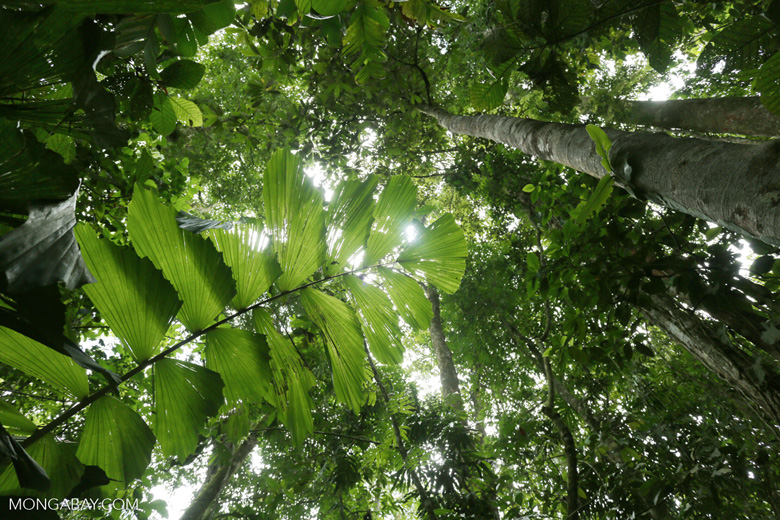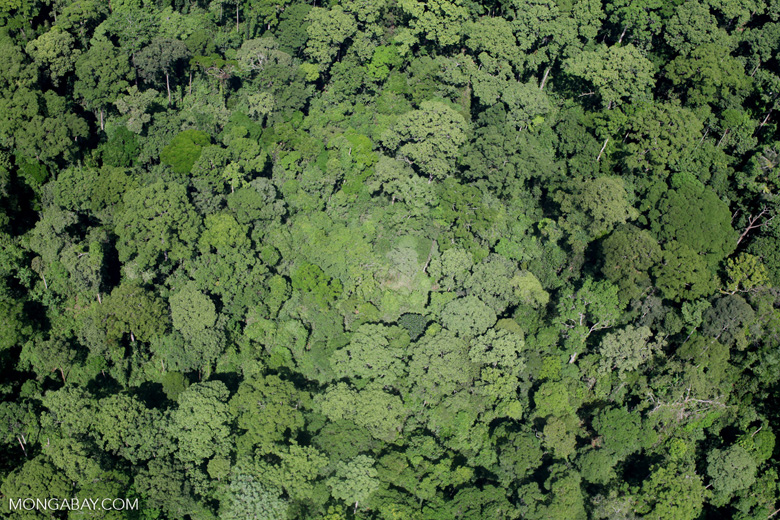- If world leaders are serious about addressing climate change, staving off the sixth great extinction, and raising living standards of the world’s rural poor, they must ‘stop the burning’ of tropical rainforests, argues a new film.
- Directed by Jeffrey Horowitz and narrated by Jane Goodall, “Stop the Burning” intersperses stunning visual imagery of forests, wildlife, and deforestation with dozens of interviews with business, political, and civil society leaders.
- The message of the nine-minute film is simple: protecting and restoring forests is critical to slowing global warming.

If world leaders are serious about addressing climate change, staving off the sixth great extinction, and raising living standards of the world’s rural poor, they must ‘stop the burning’ of tropical rainforests, argues a short, but powerful new film released yesterday in the early stages of climate talks in Paris.
Directed by Jeffrey Horowitz — the founder of Avoided Deforestation Partners, an executive producer of “Time to Choose” and the “Years of Living Dangerously TV series” — and narrated by Jane Goodall, “Stop the Burning” intersperses stunning visual imagery of forests, wildlife, and deforestation with dozens of interviews with business, political, and civil society leaders. The message of the nine-minute film is simple: protecting and restoring forests is critical to slowing global warming.
In an exclusive interview with Mongabay conducted on the eve of COP21, Horowitz discussed the film and what he hopes to achieve via the project.

AN INTERVIEW WITH JEFF HOROWITZ
How did this film come about?

Last January, I was invited to attend the World Economic Forum (WEF), in Davos, Switzerland, to participate in discussions centered around climate change and the impacts of deforestation. As a long-time advocate for protecting tropical forests, I was pleased and honored to be invited. I’m also a television and film producer, and so I immediately thought that with so many important voices in one place and at one time, it would be a wonderful “target rich” opportunity to collect thoughts and opinions on camera. Given the fact that the WEF is not accustomed to having its delegates recorded in any way, I was thrilled that the event organizers fully supported this communications project, as did the WEF participants.
From the start, my goal was to create a very clear, collective, powerful message about the urgent need to end the practice of deforestation once and for all. Collecting a good number of influential, thought-provoking voices seemed like a great way to get this important message going. Within the span of 48 hours, we managed to invite 30 distinguished thought leaders into our makeshift on site studio! These people are important leaders from government, civil society and business, and it was so inspiring to hear them offer their views on the importance of protecting the world’s forests for the well-being of our planet.
Why Dr. Goodall as the narrator for the film?
We are absolutely thrilled that Dr. Goodall lent her voice for “Stop the Burning.” Jane really respects the global leaders who took part in the film; she sees them regularly using their influence to do their utmost to make the world a better place. And, in my view, Jane’s is one of the most effective voices in the world when it comes to advocating for nature. When you hear her voice, you know in an instant that it is none other than Dr. Jane Goodall! It is a great honor to have Dr. Goodall serve not just as the film’s narrator but also as it ambassador.
What are your goals and future plans for the film?
Even though they were way back in January, all of the climate change conversations in Davos were about the road to Paris. So it’s not an accident that this film debuted on December 1, the same day that the UN launched its forest talks in Paris with world leaders present. The film is meant to start conversations and inspire people to action.
On Saturday, December 5th, we will screen “Stop the Burning” at the prestigious Grand Palais in the center of Paris. I will be there with Dr. Goodall to introduce this important collective message about forests. It will also be screened at several other venues in the city, and at the UNFCCC’s “Blue Zone.” In addition, “Stop the Burning” was launched as part of a Huffington Post op-ed, “A Message to Paris: Stop the Burning” authored by Dr. Goodall and myself. It will be shared on the websites of many of the organization associated with the 30 interviewees. We are pleased to announce that the film has been chosen as part of COP21 series on UPWORTHY, a website that promotes stories with a progressive bent on political and social issues.
Despite the current emphasis on COP 21, we do have plans to continue to share “Stop the Burning” well beyond Paris. We welcome all in the forest protection community and beyond to use this film to help spread our collective message.

What is your top take home message?
The film’s message is as multifaceted as the there are benefits to protect forests. Yes, there is an immediate urgency to end the horrific amount of carbon pollution that is attributed to deforestation but forests are so vital on so many levels from the perspective of protecting animal species, all sorts of biodiversity, air, water, people… forests represent life! Our planet simply cannot exist without them. We have already lost half of our rainforests. The other half is being seriously threatened – at the current rate of destruction, our forests will be gone by the end of this century.
The overall message in the film is that we cannot tolerate any further “slash and burn” agricultural practices, regardless of whether these come from small-scale farmers or industrialized operations. The practice of clearing land for agriculture may have been instituted centuries ago, but there are millions of acres of underutilized, perfectly usable farmland that just needs a little TLC! As the film’s title suggests, we all need to “stop the burning”…governments in particular must put an end to this utterly barbaric and extremely short-sighted form of agriculture.
It is our hope that our film will add to the chorus of the many other voices who are also demanding an end to this destructive behavior. It should be noted that the film is dedicated to those who suffered from the horrific fires from this year’s “burning season.” In Indonesia alone, 500,000 people suffered from lung issues, not to mention the extreme loss forestlands, plant and animal life.

What’s next for you in terms of filmmaking?
I am pleased to have just completed work as an Executive Producer for Academy Award-winning director/producer Charles Ferguson’s climate change film “Time to Choose.” I’m also serving as Co-Executive Producer for the second season of our Emmy Award winning climate change series, Years of Living Dangerously. The episodes will air on National Geographic, which offers potential global viewing audience of 480 million viewers, sometime in November of 2016. For Years of Living Dangerously season 2, I am in the process of working on a major story that connects beef, deforestation in the Brazilian Amazon and the drought that is ravaging Brazil. I’m looking forward to connecting the dots between beef consumption, industrial agriculture, deforestation and extreme weather like drought, and to show the viewing audience that there are some pretty interesting alternatives to animal-based protein.
